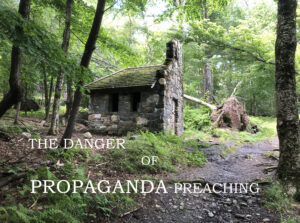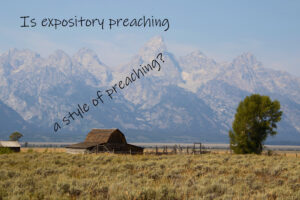Posted on Feb 5, 2025 in BLOG |
 I just finished reading John Mark Comer’s bestselling book, Practicing the Way: Be with Jesus, Become Like Him, Do as he did. Someone had asked me what I thought of the book, so I decided to read it. Spiritual formation is the buzz phrase today in pastoral circles. Many spiritual formation pastors are using Comer’s book to shape the lives of their people, so I knew I should be familiar with the way of life he promoted.
I just finished reading John Mark Comer’s bestselling book, Practicing the Way: Be with Jesus, Become Like Him, Do as he did. Someone had asked me what I thought of the book, so I decided to read it. Spiritual formation is the buzz phrase today in pastoral circles. Many spiritual formation pastors are using Comer’s book to shape the lives of their people, so I knew I should be familiar with the way of life he promoted.
I found him winsome, funny, and likable. The book is easy to read. He has a gift for presenting theology in a popular format. There are some good, practical, and helpful insights about spiritual growth in the book, and I found myself enjoying him even as I reacted skeptically to his underlying doctrines of God, sin, and the gospel. I did find it interesting how little he used the gospels to help us understand Jesus since his whole point was to be like Jesus … but that’s getting into the weeds of a thorough review. Read more…
Posted on Nov 27, 2024 in BLOG |

The election is over. Donald Trump will be the 47th president of the United States. Many who voted for him are glad, giddy, and gloating. Many who voted against him are sad, anxious, and angry. No matter who we voted for, we know, as Christians, that God is in control. He is sovereign over the affairs of this world. We trust Him, not any human, for our future. Our mission does not change with the changing political administrations.
I have been reading much lately from Daniel, who prophesied in the pagan city of Babylon, and his older contemporary, Jeremiah, who prophesied in the holy city of Jerusalem. Daniel read the prophecies of Jeremiah and gained insight into his role in serving the immoral king, Nebuchadnezzar, who had decimated his homeland (Dan. 9:2). Jeremiah sent a letter to Daniel and the other exiles urging them to serve Babylon well for God had appointed Nebuchadnezzar to rule over Jerusalem … for now (Jer. 29:1). What can we learn from these prophets for our day? Read more…
Posted on Oct 12, 2024 in BLOG |

If I live to be 80, I have approximately 4,000 weeks to spend.
[1] That’s it! It’s actually 4,160, but who wants to be so precise? Life is crazy short. I am 70, so I have spent about 3,500 weeks already and have only about 500 weeks left to spend until I’m 80. No wonder we say, “Time flies!” Life is a single breath on a cold morning, here for a moment and then gone (James 4:14). How we spend our weeks is how we spend that breath. William Penn once said,
Time is what we want most, but what we use worst.
[2] So … how do we spend our four thousand weeks?
Posted on Jul 31, 2024 in BLOG |

Like many of you, we were watching the opening ceremonies for the Olympics when we were shocked by the drag queen scene that appeared to mock Jesus Christ and the Last Supper. Although the French producer claims it was a depiction of Dionysus and the Greek gods,
[1] the religious overtones of the scene are unmistakable.
The drag queen “Last Supper” parody and several other raunchy sexual performances remind me of what the prophet Jeremiah said almost twenty-five hundred years ago. “Were they ashamed when they committed abomination? No, they were not at all ashamed; they did not know how to blush” (Jer. 8:12).
Posted on Jun 12, 2024 in BLOG |
 I recently had cataract surgery, a common surgery as we get older. I learned much about vision and focus after the cataracts were removed and new lenses installed in my eyes. My new lenses are set for distance vision, which makes focusing up close difficult. I needed reading glasses, so I went to the store to purchase some cheap ones. Not knowing much about reading glasses, I assumed that the higher the magnification, the better I could see the text. So, I purchased a 3.0 magnification level. I found that the text was only in focus at about 6-8 inches.
I recently had cataract surgery, a common surgery as we get older. I learned much about vision and focus after the cataracts were removed and new lenses installed in my eyes. My new lenses are set for distance vision, which makes focusing up close difficult. I needed reading glasses, so I went to the store to purchase some cheap ones. Not knowing much about reading glasses, I assumed that the higher the magnification, the better I could see the text. So, I purchased a 3.0 magnification level. I found that the text was only in focus at about 6-8 inches.
The eye doctor informed me that I misunderstood the way the lens works. Yes, the diopter number indicates the level of magnification, but more importantly, it is all about the focal distance. The higher the magnification, the closer the focal distance. If I want to read text at 12-14 inches, I need a lens that is 2.0 diopters, even less if I want to see clearly at 2 feet. Focal distance is the critical issue. At what point do I want to focus my vision?
Read more…
Posted on Feb 6, 2024 in BLOG |

How did COVID-19 affect the church in the United States? How did pastors cope with the pandemic and its aftermath? Most of us understand the impact on a micro level – our local church or association of churches – but we don’t understand the impact on a macro level – the church in the United States.
Christianity Today published a year-long study of 1,164 pastors around the United States in 2023. The authors also utilized 17 focus groups with participants from 27 states. Finally, they conducted 9 case studies in 9 different cities to arrive at their results. The results have been published in an article entitled “The Impact of COVID-19 on the American Church.” If you want to read the complete report, you can access it here. https://pages.churchsalary.com/covidstudy
After reading the report, I have six summary observations about the results. Read more…
Posted on Nov 20, 2023 in BLOG |
 I read, listen to, and watch many sermons. Expository sermons commonly include much application but little exhortation, and there is a difference. The typical evangelical sermon today follows a predictable pattern.
I read, listen to, and watch many sermons. Expository sermons commonly include much application but little exhortation, and there is a difference. The typical evangelical sermon today follows a predictable pattern.
Read and explain the text.
Draw applications to our lives today.
End with Jesus and what He has done for us.
Whatever happened to exhortation? Read more…
Posted on Aug 23, 2023 in BLOG |
 A new communication tool emerges that can spread information to large groups of people more rapidly than ever before in history. People use this communication tool for good and bad – to spread truth and promote falsehood. It sounds like social media today, doesn’t it? Over 500 years ago, the church discovered the power of popular pamphlets. Gutenberg invented the printing press around 1436 to print books, but in the 1500s, reformers like Martin Luther discovered the power of pamphlets to spread their message directly to the people, bypassing the control of the church. Pamphlets could be printed in two days and sold for next to nothing on the streets. Pamphlets became the Twitter (X) of the 1500s![1]
A new communication tool emerges that can spread information to large groups of people more rapidly than ever before in history. People use this communication tool for good and bad – to spread truth and promote falsehood. It sounds like social media today, doesn’t it? Over 500 years ago, the church discovered the power of popular pamphlets. Gutenberg invented the printing press around 1436 to print books, but in the 1500s, reformers like Martin Luther discovered the power of pamphlets to spread their message directly to the people, bypassing the control of the church. Pamphlets could be printed in two days and sold for next to nothing on the streets. Pamphlets became the Twitter (X) of the 1500s![1]
If the eight-page pamphlet was the Twitter of the day, wood carvings were the Facebook of the 1500s. Woodcuts were engraved pamphlets used to spread ideas in a visual format. The Roman Catholic Church used woodcuts to fight back against the Reformation in what became known as the “propaganda wars.” Hans Brosamer produced woodcuts picturing Martin Luther as the seven-headed dragon of the Apocalypse. The reformers responded. Lucas Cranach created woodcuts that caricatured the Pope as the Antichrist standing over an altar of money with Satan as the driving force.[2]
Read more…
Posted on Jul 5, 2023 in BLOG |
“Do we really have to have one main idea for a sermon?” A pastor voiced his thought to me a few years ago. “It seems to me there are many ideas in the Scripture, and we should cover all of them.” I have had two conversations recently about the same subject. One pastor specifically asked about Abraham Kuruvilla’s argument against the big idea.
Is the big idea dead?
Read more…
Posted on Apr 4, 2023 in BLOG |
 I frequently hear or read people who reject expository preaching because it’s not their style. Articles and even textbooks on homiletics sometimes refer to the different preaching styles as topical, textual, and expository. “If you want to preach expository sermons, that’s your style, but it’s not my style,” some pastors say. Others go further and argue that the style of expository preaching will not work in today’s world.
I frequently hear or read people who reject expository preaching because it’s not their style. Articles and even textbooks on homiletics sometimes refer to the different preaching styles as topical, textual, and expository. “If you want to preach expository sermons, that’s your style, but it’s not my style,” some pastors say. Others go further and argue that the style of expository preaching will not work in today’s world.
Is expository preaching a style of preaching? Read more…
 I just finished reading John Mark Comer’s bestselling book, Practicing the Way: Be with Jesus, Become Like Him, Do as he did. Someone had asked me what I thought of the book, so I decided to read it. Spiritual formation is the buzz phrase today in pastoral circles. Many spiritual formation pastors are using Comer’s book to shape the lives of their people, so I knew I should be familiar with the way of life he promoted.
I just finished reading John Mark Comer’s bestselling book, Practicing the Way: Be with Jesus, Become Like Him, Do as he did. Someone had asked me what I thought of the book, so I decided to read it. Spiritual formation is the buzz phrase today in pastoral circles. Many spiritual formation pastors are using Comer’s book to shape the lives of their people, so I knew I should be familiar with the way of life he promoted.

 If I live to be 80, I have approximately 4,000 weeks to spend.
If I live to be 80, I have approximately 4,000 weeks to spend. Like many of you, we were watching the opening ceremonies for the Olympics when we were shocked by the drag queen scene that appeared to mock Jesus Christ and the Last Supper. Although the French producer claims it was a depiction of Dionysus and the Greek gods,
Like many of you, we were watching the opening ceremonies for the Olympics when we were shocked by the drag queen scene that appeared to mock Jesus Christ and the Last Supper. Although the French producer claims it was a depiction of Dionysus and the Greek gods, I recently had cataract surgery, a common surgery as we get older. I learned much about vision and focus after the cataracts were removed and new lenses installed in my eyes. My new lenses are set for distance vision, which makes focusing up close difficult. I needed reading glasses, so I went to the store to purchase some cheap ones. Not knowing much about reading glasses, I assumed that the higher the magnification, the better I could see the text. So, I purchased a 3.0 magnification level. I found that the text was only in focus at about 6-8 inches.
I recently had cataract surgery, a common surgery as we get older. I learned much about vision and focus after the cataracts were removed and new lenses installed in my eyes. My new lenses are set for distance vision, which makes focusing up close difficult. I needed reading glasses, so I went to the store to purchase some cheap ones. Not knowing much about reading glasses, I assumed that the higher the magnification, the better I could see the text. So, I purchased a 3.0 magnification level. I found that the text was only in focus at about 6-8 inches.
 I read, listen to, and watch many sermons. Expository sermons commonly include much application but little exhortation, and there is a difference. The typical evangelical sermon today follows a predictable pattern.
I read, listen to, and watch many sermons. Expository sermons commonly include much application but little exhortation, and there is a difference. The typical evangelical sermon today follows a predictable pattern. A new communication tool emerges that can spread information to large groups of people more rapidly than ever before in history. People use this communication tool for good and bad – to spread truth and promote falsehood. It sounds like social media today, doesn’t it? Over 500 years ago, the church discovered the power of popular pamphlets. Gutenberg invented the printing press around 1436 to print books, but in the 1500s, reformers like Martin Luther discovered the power of pamphlets to spread their message directly to the people, bypassing the control of the church. Pamphlets could be printed in two days and sold for next to nothing on the streets. Pamphlets became the Twitter (X) of the 1500s!
A new communication tool emerges that can spread information to large groups of people more rapidly than ever before in history. People use this communication tool for good and bad – to spread truth and promote falsehood. It sounds like social media today, doesn’t it? Over 500 years ago, the church discovered the power of popular pamphlets. Gutenberg invented the printing press around 1436 to print books, but in the 1500s, reformers like Martin Luther discovered the power of pamphlets to spread their message directly to the people, bypassing the control of the church. Pamphlets could be printed in two days and sold for next to nothing on the streets. Pamphlets became the Twitter (X) of the 1500s!
 I frequently hear or read people who reject expository preaching because it’s not their style. Articles and even textbooks on homiletics sometimes refer to the different preaching styles as topical, textual, and expository. “If you want to preach expository sermons, that’s your style, but it’s not my style,” some pastors say. Others go further and argue that the style of expository preaching will not work in today’s world.
I frequently hear or read people who reject expository preaching because it’s not their style. Articles and even textbooks on homiletics sometimes refer to the different preaching styles as topical, textual, and expository. “If you want to preach expository sermons, that’s your style, but it’s not my style,” some pastors say. Others go further and argue that the style of expository preaching will not work in today’s world.
